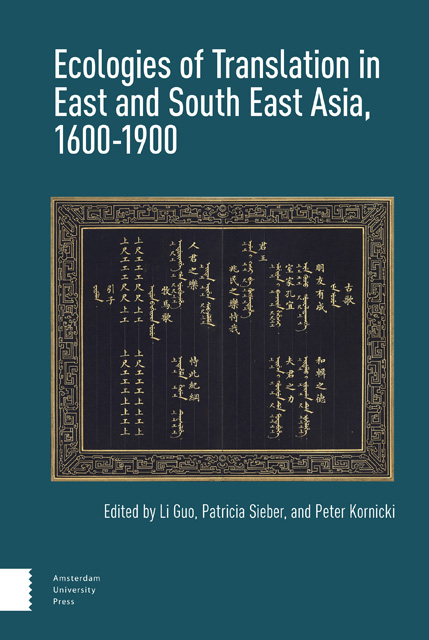Book contents
- Frontmatter
- Table of Contents
- Introduction: Scriptworlds, Vernacularization, and Shifting Translation Norms
- 1 On Not Being Shallow: Examination Essays, Songbooks, and the Translational Nature of Mixed-Register Literature in Early Modern China
- 2 A Faithful Translation: Tsūzoku sangokushi, the First Japanese Translation of Sanguozhi yanyi
- 3 Romance of the Two Kingdoms: Okajima Kanzan’s Chinese Explication of ‘The Annals of Pacification’ (Taiheiki engi)
- 4 Speaking the Sinitic: Translation and ‘Chinese Language’ in Eighteenth-Century Japan
- 5 ‘Body Borrowed, Soul Returned’: An Adaptation of a Chinese Buddhist Miracle Tale into a Vietnamese Traditional Theatrical Script
- 6 ‘Out of the Margins’: The Western Wing Glossarial Complex in Late Chosŏn and the Problem of the Literary Vernacular
- 7 Vernacular Eloquence in Fiction Glossaries of Late Chosŏn Korea
- 8 Imagined Orality: Mun Hanmyŏng’s Late Nineteenth-Century Approach to Sinitic Literacy
- 9 Linguistic Transformation and Cultural Reconstruction : Translations of Gorky’s ‘Kain and Artem’ in Japan and China
- Index
6 - ‘Out of the Margins’: The Western Wing GlossarialComplex in Late Chosŏn and the Problem of theLiterary Vernacular
Published online by Cambridge University Press: 16 November 2022
- Frontmatter
- Table of Contents
- Introduction: Scriptworlds, Vernacularization, and Shifting Translation Norms
- 1 On Not Being Shallow: Examination Essays, Songbooks, and the Translational Nature of Mixed-Register Literature in Early Modern China
- 2 A Faithful Translation: Tsūzoku sangokushi, the First Japanese Translation of Sanguozhi yanyi
- 3 Romance of the Two Kingdoms: Okajima Kanzan’s Chinese Explication of ‘The Annals of Pacification’ (Taiheiki engi)
- 4 Speaking the Sinitic: Translation and ‘Chinese Language’ in Eighteenth-Century Japan
- 5 ‘Body Borrowed, Soul Returned’: An Adaptation of a Chinese Buddhist Miracle Tale into a Vietnamese Traditional Theatrical Script
- 6 ‘Out of the Margins’: The Western Wing Glossarial Complex in Late Chosŏn and the Problem of the Literary Vernacular
- 7 Vernacular Eloquence in Fiction Glossaries of Late Chosŏn Korea
- 8 Imagined Orality: Mun Hanmyŏng’s Late Nineteenth-Century Approach to Sinitic Literacy
- 9 Linguistic Transformation and Cultural Reconstruction : Translations of Gorky’s ‘Kain and Artem’ in Japan and China
- Index
Summary
Abstract
Inspired by studies of TheWater Margin, the development of Chinesevernacular fiction, and its influence in EdoJapan, this chapter moves beyond generic andsocietal margins – the marginalized position ofxiaoshuo narrativein traditional China and the liminal social statusof the protagonists of TheWater Margin – to the literal margins ofthe page, and focuses on late-Chosŏn Korea(1392-1897) and its encounter with LiteraryVernacular Sinitic through the specific case ofone literary work and its reception in Korea:Xixiangji 西廂記 orThe Story of the WesternWing. Through an examination of glossing,annotation, and commentary in the late-Chosŏn‘XixiangjiGlossarial Complex’, this chapter tries tocomplicate our understanding of the history ofvernacularization and translation in Korea.
Keywords: Literary Vernacular,Sinographic Cosmopolis, Xixiangji, vernacularization,glossing
Introduction
The title of this chapter is inspired by Ge Liangyan'swonderful study of the development of Chinesevernacular fiction. Ge's book tackles variousquestions of vernacularization and the rise of a newliterary vernacular in late imperial China throughthe lens of what he calls ‘the Shuihu complex’ and its eventualcrystallization in Shuihuzhuan 水滸傳. But whereas Ge's title alludesto generic and societal margins – the marginalizedposition of xiaoshuo小說 narrative in traditional China and the liminalsocial status of the protagonists in The Water Margin – my focushere is literally on the margins of the page,whether printed or (more especially) manuscript. Andmy focus is on late-Chosŏn Korea (1392-1897) and itsencounter with precisely the sort of literaryvernacular Sinitic that Ge studies in his book.
The title of the conference at which this chapter wasfirst presented was ‘Accessing “Baihua” in Korea and Vietnam, with aFocus on the Reception of the Xixiangji’, but please note the scarequotes around the problematic term ‘baihua’ 白話. As so manyresearchers have been quick to point out, the termsbaihua and wenyan 文言, as well as theiralleged antagonism in earlier times, aretwentieth-century inventions and legacies of the MayFourth movement. Harbsmeier reminds us that ‘theterm baihua is asmodern as the term wenyan.
- Type
- Chapter
- Information
- Ecologies of Translation in East and South East Asia, 1600-1900 , pp. 175 - 222Publisher: Amsterdam University PressPrint publication year: 2022



